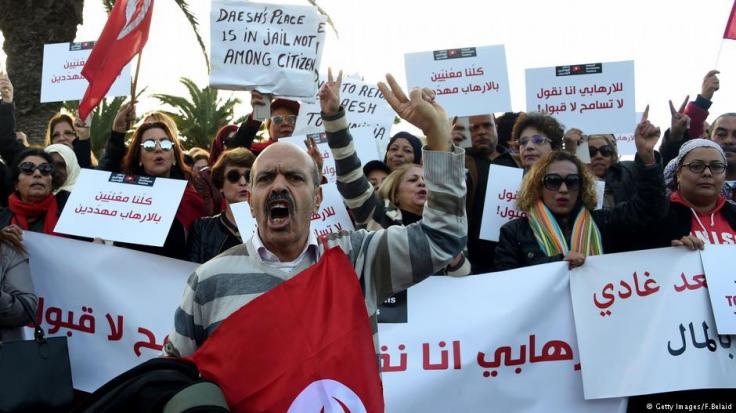Protests in Tunisia over return of jihadis like Amri

Organizers said 1,500 people had attended Saturday's rally in the capital Tunis, many carrying banners reading "Close the doors to terrorism" and "No tolerance, no return." Protesters also waved Tunisian flags and sang the national anthem.
Activists said they were angry at the lack of government action to prevent jihadists who fought overseas from returning to the country without facing punishment.
The demonstration was held less than a day after Tunisian police said they had arrested three alleged Islamist extremists connected to Tunisian-born Anis Amri, the main suspect in Monday's Berlin Christmas market attack.

Jihadis head home
More than 5,000 Tunisians are fighting for jihadist groups abroad, mainly in Iraq, Syria or neighboring Libya, according to a UN working group on mercenaries.
Authorities say they have put more than 800 Tunisians under surveillance since returning home.
But protesters said the government was not doing enough to round up ex-fighters upon return to face trial.
One demonstration Faten Mejri said "for us, they are not Tunisians. They are awful people."
Protestors also hit out at the head of the Islamist Ennahda party, who has in the past supported the idea of allowing Tunisian jihadists who "repent" and renounce violence to return home.
President Beji Caid Essebsi said earlier this month that Tunisia would refuse to pardon Tunisians who fight for jihadist organizations. But he told the Agence France-Presse news agency that authorities "can't prevent a Tunisian from returning to his country."
His comments were denounced on social media and in the press.
Since its 2011 revolution, Tunisia has faced repeated jihadist attacks, killing more than 100 soldiers and policemen, as well as about 20 civilians and 59 foreign tourists, according to official figures.

Amri was due to be returned
Intelligence agencies have warned several times that jihadists from the Middle East and North Africa may ply the migrant trail to Europe to carry out attacks.
Twenty-four-year-old Anis Amri, who had claimed asylum in Germany but who had his case rejected, ploughed a truck into revelers at a Christmas market in an upscale Berlin neighborhood on Monday, killing 12 people and wounded nearly 50 others.
On the run from German authorities, he was shot dead by police in Milan four days later.
His deportation from Germany was never enforced because of delays by Tunisia in confirming he was one of their nationals.
Amri's nephew was among three people, aged between 18 and 27, detained on Friday by Tunisian authorities, accused of being members of a "terrorist cell" connected to Amri.
The country's interior ministry said in a statement that Amri had sent money to his nephew so he could join him in Germany, and had allegedly urged him "to pledge allegiance to Daesh," referring to the Arabic name for the "Islamic State" (IS) armed group.
The unnamed nephew also claimed his uncle was the leader of a jihadist group based in Germany, known as the Abu al-Walaa brigade, it added.
dw.com
